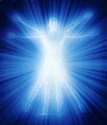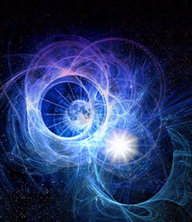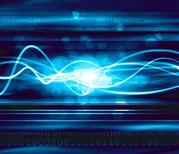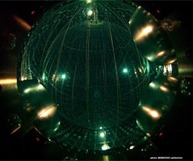
For sixteen years I've devoted my life to researching the world of quantum behaviour and finding links to our own social constructs. Many such links exist. The more you delve, the more synergy you find. Now, one could say that you can read into anything the very thing that you would most like to read, but quantum mechanics has some special loopholes which enable that very subjectiveness to have free rein. And this in itself could be one of the reasons a number of scientists including Richard Feynman, Neils Bohr and Erwin Schroedinger have said that if you think you understand quantum mechanics, then you don't. What we can understand of it gives us real, unarguable provision for leading better lives in accordance with laws which the universe itself has laid down; that's why Quantumology came into being.

However, the universe doesn't work that way. Sure, it has powers. Those powers are kept in a tidy balance through a system called ‘entanglement', or ‘tangled hierarchy'. Unlike the human stage, the universal stage doesn't allow for absolution of power, and corruption is a no-go. Power is as power does and each power has corresponding powers to counteract or support it. Take gravity, for instance. This is a power at work in all our lives all the time, keeping our feet on the ground. Strange as it may seem, the force of gravity has remained a mystery to physicists since Newton and his peers first brought it to light. Even now, with Dark Energy entering the cosmological equation, scientists are having to question whether they need to rethink their fundamental beliefs about gravity and start again with some new theories.


In every atom of everything with more than one electron to its name, this up-down energy jumping occurs, and can be induced by temperature and other atmospheric conditions. But electrons, while being rather readily excited, have a predilection for ‘ground state', that is, the lowest energy level the atom will allow. Like us, they are intrinsically lazy. Unless, like us, they are motivated to a higher level of energy, in which case they need light to let them do the job.
The Sun, which feeds our planet with the light it needs to maintain life, also emits vast quantities of particles called Neutrinos. Billions of these minuscule entities pass through every square inch of everything every second. They are so small that they pass right through the expanse of space in each atom totally unhindered. Sometimes they collide with an electron, leaving a distinct track which scientists all over the world have set up multi-billion-pound/dollar detectors to study. But even the Sun, emitting unfathomable quantities of neutrinos all the time, cannot produce enough to satisfy the requirements of global research, so the scientists have also built ‘neutrino factories' which beam the little particles right through the Earth, from one observation station to another.

The Universe is a big place. Some say it's infinite, some say it's expanding, some still argue the toss over where it's going and where it came from. What we do know is that the Universe has rules, and they are not as complicated as some would like us to believe.
Stuck in a rut of over-indulgence and political insanity, it's really up to us to get out of it. We're not going to get far by relying on powers which consider themselves absolute to show a modicum of sense in leading us back to the garden. We have to get back to the garden on our own, and see from there where we can go next. Our own gardens, our own lives, our own relationships, all are subject to the laws of the Universe and when we know more about what those laws are, at least in principle, then we can decide on which track we want to take. There is no restriction, and there are no guidelines set in stone. Information is as much a fabric of the universal continuum as matter and energy, as Stephen Hawking discovered (via Hawking Radiation). There in the plethora of options available to us, we have choices, no holds barred. Our free will exercises these choices, and every time we make one, as any quantum physicist will tell you, the universe splits - but that's another story, maybe for another time.
 RSS Feed
RSS Feed
